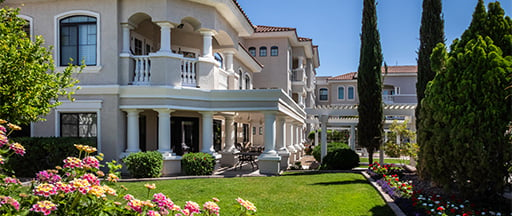
About The Terraces of Phoenix
Here in the heart of north Phoenix, you’ll find a refreshing oasis and a welcoming, established nonprofit Life Plan Community. Our community, set on a 22-acre campus with plentiful green space, lush gardens, trees and pathways, fosters a friendly, small-town neighborhood feel.

Discovering life’sideal balance.
We all want to live with purpose. Feel vital. Stay connected with family and friends. Keep learning and growing. Contribute to our community. Our goal is to help you do just that.
We’re The Terraces of Phoenix, a premier nonprofit Life Plan Community in Phoenix. We’ve created an environment designed to support your total well-being from which you can pursue your best life — however you define it.

Meet The Terraces of Phoenix team.

Mariele Soriano
Executive Director

Jason Giorgio
Director of Sales

Ruth Padula
Director of Resident Services

James White
Facilities Director

The Rev. Dr. Troy C. Epps
Chaplain

Debbie Goldman
Human Resources Director
Who is HumanGood?
Be purposeful. Stay engaged. Keep in the game. Continue to make a difference. Be connected to family and friends. This is life the way it’s meant to be lived.
At HumanGood, our goal is to inspire people to live their best lives as they define them and to feel empowered to use all that they have learned and accomplished to shape a future of their own design.
For more than 70 years, HumanGood has been a leading nonprofit senior living provider of exemplary homes and services for older adults. Today, we serve more than 13,000 residents in over 125 Life Plan and Affordable Housing Communities nationwide.


What’s the nonprofit difference?
The Terraces of Phoenix is part of HumanGood, a leading nonprofit provider of senior living that's been in operation for more than 70 years. As a nonprofit, we don’t need to provide a return to shareholders, so we are able to reinvest our financial resources back into our communities. In addition, we operate a nonprofit foundation that provides financial support to Life Plan contract residents who outlive their resources through no fault of their own. That’s the peace of mind a nonprofit offers.
Get answers to frequently asked questions.
Simply put, a Life Plan Community (also known as a continuing care retirement community or CCRC) is a community for older adults that offers independent living residences and access to higher levels of care all on one campus.
Independent residences are typically renovated with the latest in home fits and finishes and offer the freedom of maintenance-free living. For a set monthly fee, virtually everything is included: fresh dining, housekeeping, engaging amenities, and a myriad of cultural, social, educational, fitness and wellness programs.
Should a time come when extra support would be beneficial or required, a plan is in place. Specialized care — assisted living, memory support, short-term rehabilitation and long-term nursing — right on campus provides just what’s needed when it’s needed in welcoming environments.
Choosing to move to a Life Plan Community is about more than a maintenance-free lifestyle and having a plan in place for future care needs. If you are a proactive person, it’s about setting yourself up to ensure you are living life to the fullest. By having more time to do what you want to do — not what you have to do. By expanding your opportunities to be socially connected. By living in an environment designed to support total wellness. And ultimately, by having security and peace of mind for you and those who love you.
A 55+ community offers independent living homes that usually include a maintenance-free lifestyle and a campus with common spaces and amenities. A Life Plan Community such as The Terraces of Phoenix does the same, and, in addition, it offers various care options on campus. This means that if the health of you or your spouse ever changes, a plan will be in place. You won't need to move or be separated.
Choosing to move to a Life Plan Community is about more than a maintenance-free lifestyle and having a plan in place for future care needs. If you are a proactive person, it’s about setting yourself up to ensure you are living life to the fullest. By having more time to do what you want to do — not what you have to do. By expanding your opportunities to be socially connected. By living in an environment designed to support total wellness. And ultimately, by having security and peace of mind for you and those who love you.
The Terraces of Phoenix offers independent living apartment homes in a wide range of sizes and floor plans. All apartments are beautifully designed and maintenance-free. And, of course, all residents have access to a wealth of amenities across our 22-acre campus.
As an independent living resident with a Life Plan contract, you will pay a monthly fee and a one-time entrance fee. Both types of fees vary considerably depending on the size and type of home you choose. In addition, entrance fees vary by whether you select a nonrebatable or rebatable entrance fee option. (Rebatable means a portion of your entrance fee is returned to you or your estate when you leave the community.)
Please contact our sales counselors to learn more about available floor plans and their fees.
If you would like to understand what type of home you could afford at The Terraces of Phoenix, take this simple quiz.
Yes, The Terraces of Phoenix is part of HumanGood, a leading nonprofit provider of exemplary senior living services with a mission of inspiring your best life. As a nonprofit, we don’t need to provide a return to shareholders, so we are able to reinvest our financial resources back into our communities. In addition, we operate a nonprofit foundation which provides financial support to Life Plan contract residents who outlive their resources through no fault of their own.
The benefit of a Life Plan Community such as The Terraces of Phoenix is that you have a plan in place for possible future care needs. On our campus, we offer not only independent living residences but also assisted living, memory support and a skilled nursing center that can help with short-term recovery from a health event or a long-term care need. As needs change, we work with you to determine what options are best and to add support only as needed to preserve autonomy and independence.
No, The Terraces of Phoenix is not a traditional nursing home. It is a Life Plan Community, where the majority of residents live independently. We offer independent living residences and a continuum of care options — assisted living, memory support and skilled nursing care — should they be needed on one campus. Our care options also include short-stay rehabilitation nursing for people who have been discharged from a hospital stay but are not yet strong enough to return to their homes.
Yes, as a Life Plan Community we offer independent living plus a continuum of care options. One of those options is short-term rehabilitation care in our skilled nursing center. Our medical staff and rehabilitation therapists develop personalized recovery plans to help people following a hospitalization or major health event. Learn more about short-term rehabilitation.
Stay updated with The Terraces of Phoenix.
Sign up for the latest news. We will never sell or share your email address.
 community
community

